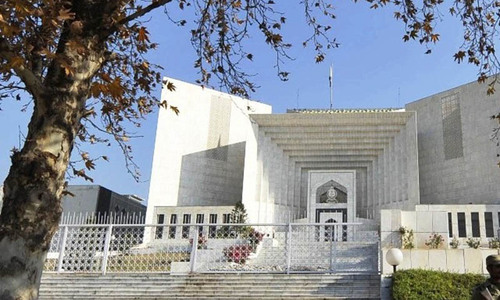ISLAMABAD: In a notable development, the Supreme Court on Wednesday summoned record of persons put in seven internment centres and warned the Khyber Pakhtunkhwa government not to remove or shift any detained person from the centres.
While pointing towards the province’s Additional Advocate General Qasim Wadood, Chief Justice Asif Saeed Khosa said: “We know during the hearings at the Peshawar High Court (PHC), some interned persons were moved here and there.” This practice should not be repeated because lives of the people in question were in peril, he added.
The chief justice, as head of a five-judge bench, was hearing an appeal moved by the federal government against the PHC’s judgement that had declared as ultra vires the KP Action (in Aid of Civil Powers) Ordinance 2019 and also held illegal the KP Continuation of Laws in Erstwhile PATA Act 2018 and the KP Continuation of Laws in Erstwhile FATA Act 2019.
In addition to the government’s appeal, a joint challenge by PPP leader Farhatullah Babar and human rights activists Afrasiab Khattak, Bushra Gohar and Rubina Saigol was also before the bench through which the court has been requested to scrap the KP Action in Aid of Civil Power Ordinance 2019 because it “impinges upon citizen’s fundamental rights”.
Advocate Khawaja Ahmad Hosain argued the case petition.
The main ordinance authorises the armed forces to detain an individual at anytime, anywhere in the province without assigning any reason and without producing the accused before a court of law.
On Oct 24, the apex court suspended the PHC verdict and decided to constitute the present larger bench, which comprises Justice Gulzar Ahmed, Justice Mushir Alam, Justice Umar Ata Bandial and Justice Qazi Faez Isa, in addition to the chief justice.
On Wednesday, the Supreme Court ordered the additional advocate general to furnish a complete history about how the laws relating to internment centres were formulated and the centres set up.
Thus by Thursday (today), the provincial government will provide the complete details of persons interned in the centres, including their parentage, the charges against them and the period from which they are under detention. The provincial government will also explain who control the functioning of these centres.
While going through the ordinance, Chief Justice Khosa observed that a person could only be interned on the instructions of the governor or authorised officers and wondered if officers of the armed forces could fall within the definition of authorised officers.
“Here we are dealing with the citizens and their fundamental rights, which have been guaranteed under the Constitution,” said Chief Justice Khosa.
“Can this court allow anybody to usurp the civil powers?” he asked, adding that even if the armed forces were called in aid of the civil authority, the civil powers remained intact.
“Can we allow a situation where the helping party assumes all the powers and the civil power which has asked for help left with no power at all,” he said, adding that “in fact this is usurpation of power”.
“Under Article 10A of the Constitution, which ensures fair trial and due process of law, a person can be detained for a day but after that it is the judicial authority which controls the detention,” he said.
Could the judicial power as well as the civil power be taken away through Article 245 of the Constitution under which the armed forces may be called in aid of the civil powers?
“Could the persons be detained for an indefinite period in the internment centres,” asked Justice Gulzar Ahmed.
At the outset of the hearing, Attorney General Anwar Mansoor took exception to the presence of Justice Isa on the bench and said “one of my lords” had objected to him, the federal government, the prime minister and the president as a result of which the judge’s presence in the court would create an apparent bias.
But the chief justice dismissed the objections and at the end of the hearing said to the attorney general: “We as judges are under oath and performing our functions and dispensing justice without any ill will, fear or favour and without any personal feelings. We will do justice to the cause without any ill will.”
Published in Dawn, November 14th, 2019















































Dear visitor, the comments section is undergoing an overhaul and will return soon.